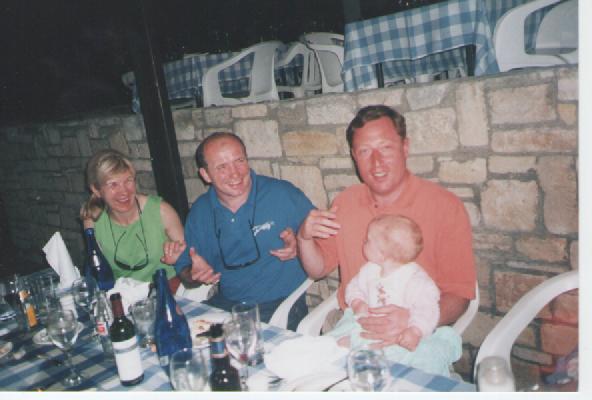
THE FUNERAL of Rab Wood took place on April 5th at Woking Crematorium attended by hundreds of family, friends and colleagues.
Many mourners travelled from various parts of the globe to say a final farewell to this unique man.
Although Rab was just 54 when he died, he had lived a life of many men.
And the respect and affection he commanded and earned was, in our experience, without parallel.
Rab entered the chapel, his coffin draped with the cross of St Andrew, to the strains of a lone piper playing Flower of Scotland.
For a man deemed indestructible, it was a poignant moment, especially for his devoted wife Sue, his two teenage sons and his two brothers.
The mourners included many of his colleagues from the security services and the military, including Simon Mann.
Rab had been a good friend of the forces charity Talking2Minds over the past few years.
Our thoughts and prayers are with his family.
It is impossible to write an obituary for Rab Wood without incurring a D Notice from the MoD.
And to write a censored version would do him no credit.
So I will leave you with a story about our beloved friend Rab, which I think sums him up perfectly.
Many years ago – I would have been in my early 20s and Rab a little older - he was instructing me how to use a Browning 9mm pistol.
Guns have never interested me and I was more curious to find out if he could, unarmed, disarm a person with a gun.
Usual Rab nonchalance and non-committal noises ensued.
Foolishly, I persisted.
Eventually he relented.
“OK, here’s the gun. It’s not loaded but I want you to listen very carefully.
“Press the gun into the small of my back, shout, ‘hands up!’ and pull the trigger and I’ll show you.”
At this point I have to confess I was more than a little nervous. If truth be told, I started back-peddling on the whole idea. “No, no….just talk me through it man!” that sort of thing.
Rab was having none of it. I’d nagged him into it, he was going to show me and there was no going back.
I took the Browning, placed it in the small of his back, shouted, ‘hands up!’ and pulled, or at least tried to pull the trigger.
In an instant, I was stunned and face first on the floor with my gun hand behind my back as Rab wrenched it from my grasp.
Seeing me sprawled on the floor, half concussed, he gently helped me back to my feet, gave me a big hug, kissed me on the cheek, threw his head back and roared with laughter.
After making sure I was OK he took me through the whole procedure – which had lasted barely two seconds - in slow motion.
I had approached him from behind, pressed the Browning into the small of his back, shouted, ‘hands up!’ and attempted to pull the trigger.
At that point Rab had forced his body onto the muzzle of the pistol, causing the ‘barrel to slide’ mechanism to jam. So when I pulled the trigger, it jammed too.
This is when Rab swung his left arm behind him and landed a very, very strong blow to the left side of my jaw with his elbow.
I was stunned to the point of starting to fall to the floor. Rab spun round, grabbed my pistol hand and pushed me to the floor face down with my pistol hand behind my back before disarming me.
I was confounded. Rab was concerned to make sure he hadn’t broken my jaw, moving it from side to side and asking, “can you feel anything grinding?”
After declaring me fit, I casually mentioned it had been a very good job indeed that that gun wasn't loaded.
Rab looked at me, grinned that famous slightly jagged grin of his, pointed the gun into the air and pulled the trigger.
It was.
Rest in peace, our courageous, outrageous, daring, bold, kind, affectionate, loving, loyal chum. We will all miss you terribly.
 |
| Happy days. From left: Rab's wonderfully vivacious wife Sue, Rab, me and my daughter "Bee" on holiday in Cyprus, May 1999 |









